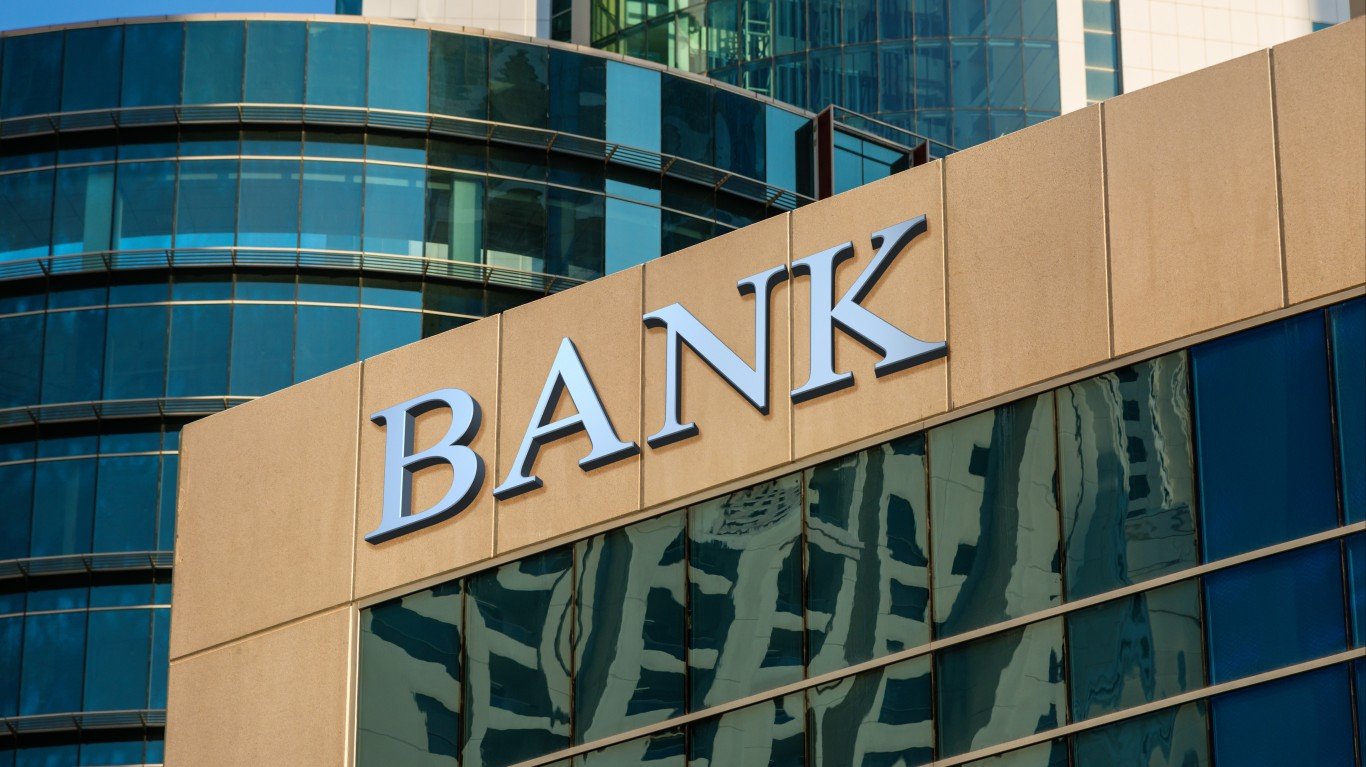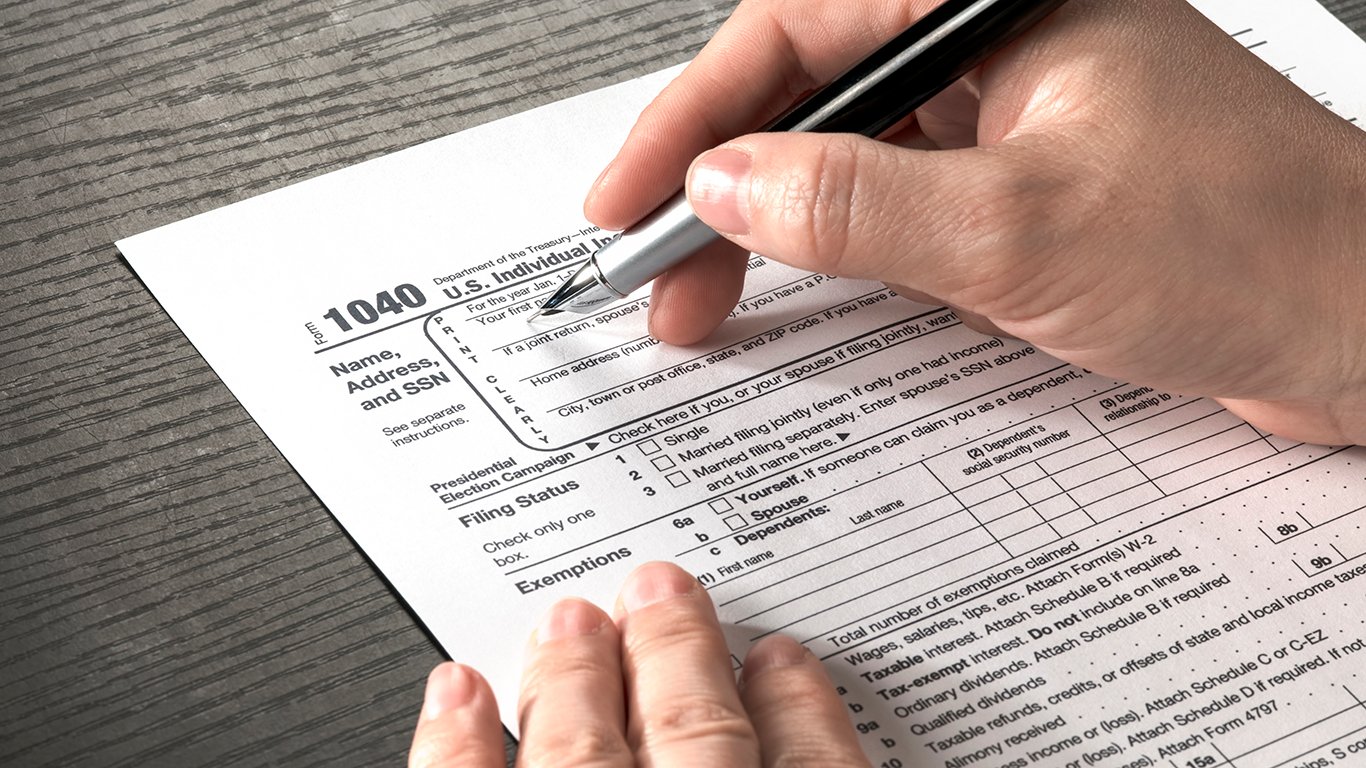

Earnings season for the fourth quarter is bringing some very mixed fanfare for investors at a time when economic numbers are slowing and earnings growth is expected to be easing. Just don’t bother telling that to the banks. After getting pummeled during the December stock sell-off, all of a sudden the value buyers are coming out in droves to bid up the big banks and many of the financial stocks again.
24/7 Wall St. has been tracking its earnings season scorecard on the major earnings announcements from companies worth billions of dollars and which also have billions of dollars in assets. One issue which routinely gets used to evaluate a bank and finance stock is the company’s share price versus its book value. The logic should be simple enough here — book value is that starting point any would-be acquirer would theoretically begin their valuation process.
In the fourth quarter, despite the massive sell-off and volatility in December, many of the major banks never did trade under their stated and tangible book values. J.P. Morgan Chase & Co. (NYSE: JPM) remained mostly unscathed and has remained consistently above book value per share, but even the bad public image of Wells Fargo & Co. (NYSE: WFC) has not created a situation where its stock has come back to within striking distance of its book value per share. If you were insightful and aggressive enough there was a two-week period in December malaise that Bank of America Corporation could be purchased at and just under book value per share, but the book value of $25.13 at the end of 2018 is now versus a $29.30 share price.
24/7 Wall St. has tracked multiple large banks which still have share prices that are valued under or very close to their stated book values per share even after the gains that were seen in the stock market and in the financial services stocks in the last week. It is important to understand that there is a stated book value based on a simple balance sheet review, and then there is a tangible book value which removes non-physical items from the balance sheet such as goodwill and intangible assets such as patents, copyrights, trademarks, trade names, a perceived value of customer relationships, trade secrets and the like.
In an effort to streamline the banks and financials trading at or under book value, 24/7 Wall St. has shown the share price as of Friday’s close (1/18/2019) and compared it to the stated book value. Tangible book value has also been included if available. We have also shown the performance of the underlying shares in the last week and year-to-date, and shown consensus analyst target prices from Thomson Reuters and the respective 52-week trading ranges.
Here are the four larger banks and financial stocks which have already reported earnings for the fourth quarter of 2018 and which are still under or very close to the stated book values per share.
Citigroup
Citigroup Inc. (NYSE: C) had some mixed earnings numbers around revenues, but Wall Street rewarded it with big gains all week. Its shares closed up 1% at $63.12 on Friday, but it was down at about $57.30 on Monday morning when the reaction was less than stellar. Citigroup ended 2018 with a stated book value of $75.05 per share and a tangible book value of $63.79 per share. Citi’s consensus analyst target price is $76.15 and its 52-week range is $48.42 to $80.70. Its shares were last seen up 11% in the last week and up 21% just since the end of 2018.
Goldman Sachs
Goldman Sachs Group Inc. (NYSE: GS) had been under deep pressure in much of December and in January due to scandals overseas and due to a larger perceived drag on its trading operations as the markets were beaten down in December. Goldman Sachs shares went under $155 during the December lows and kept hitting 52-week lows, but its stock was trading at closer to $178 prior to its earnings release. The stock closed out this last week at $202.54 after rising almost $20 on the actual earnings report this week. It’s hard to fathom that its shares have rallied more than 30% from the December lows, but Goldman Sachs reported that its 2018 book value was up over 14% from a year earlier at $207.36 per share. Its tangible book value per common share rose by over 15% in the year to $196.64 per share. Goldman Sachs shares were up 14% over the prior week and its stock price was last seen up 21% year-to-date, and it has a 52-week range of $151.70 to $275.31. The current consensus analyst target price was last seen at $226.91. For a point of reference, the consensus price targets have come down handily during its more recent troubles as that target price was $253.30 at the start of 2019 and almost $275 just at the start of November.
Morgan Stanley
Morgan Stanley (NYSE: MS) closed up 2.7% at $43.69 on Friday for a slight premium to its $42.20 book value per share. The market gain and continued re-interest in the financial sector was the driver here, because its stock was trading at $42.00 just a day earlier. This book value per share is compared to $40.67 at the end of September 2018 and to $38.52 at the end of 2017. Morgan Stanley’s tangible book value per share was at $36.99 on the last day of 2018, versus $35.50 at the end of September and versus $33.46 at the end of 2017. Morgan Stanley has a 52-week range of $36.74 to $59.38 and a consensus analyst target price of $52.50. Its shares have risen by almost 5% in the last week and 10% so far in 2019.
PacWest
PacWest Bancorp (NASDAQ: PACW) is more of a regional bank, but its market cap is still almost $5 billion. Its year-end book value was at $39.17 per share, and Friday’s gain of 2.5% to $39.55 took the share price just over that number after beating earnings expectations late in the week. Analysts had a consensus analyst target price of $44.25 on last look and its 52-week range is $31.16 to $55.86. One important issue to consider here is that the tangible book value, the bare-bones valuation model, was down at $18.02. Its stated book value was $38.46 per share and the tangible number was $17.28 per share one quarter earlier. Those figures were $38.65 and $18.28 per share, respectively, a year earlier. PacWest’s shares were last seen up 9% over the prior week and up almost 19% since the end of 2018.
Sponsored: Want to Retire Early? Here’s a Great First Step
Want retirement to come a few years earlier than you’d planned? Or are you ready to retire now, but want an extra set of eyes on your finances?
Now you can speak with up to 3 financial experts in your area for FREE. By simply clicking here you can begin to match with financial professionals who can help you build your plan to retire early. And the best part? The first conversation with them is free.
Click here to match with up to 3 financial pros who would be excited to help you make financial decisions.
Thank you for reading! Have some feedback for us?
Contact the 24/7 Wall St. editorial team.
 24/7 Wall St.
24/7 Wall St.


